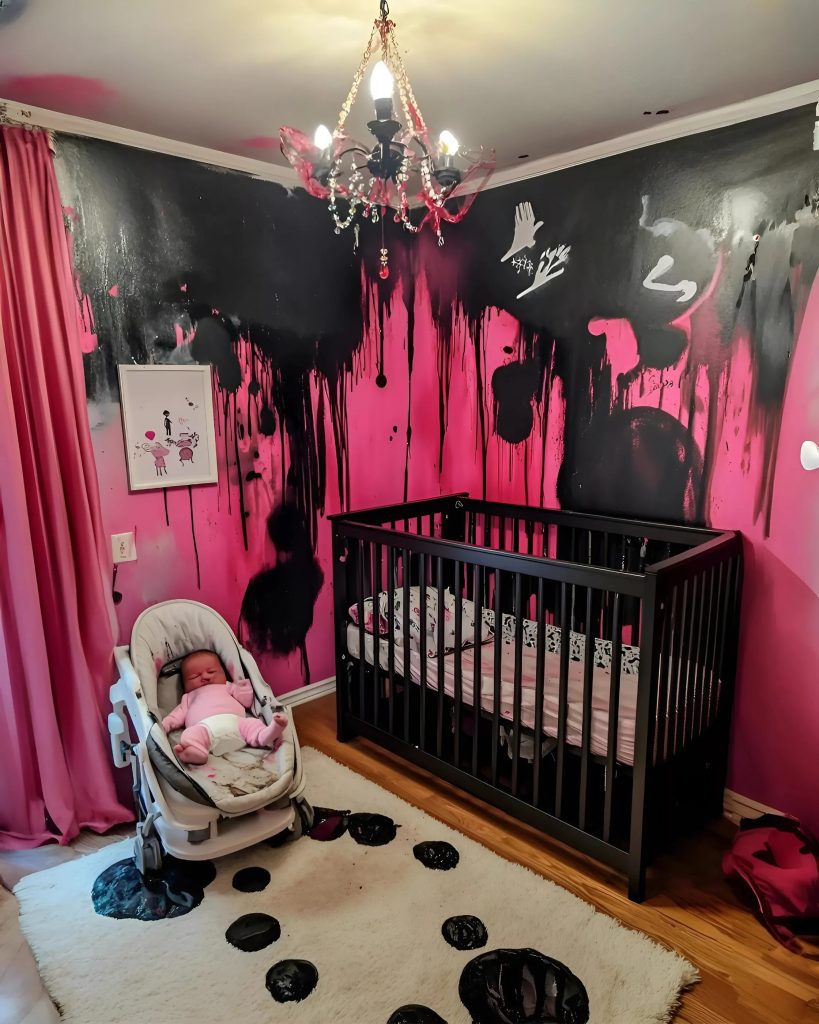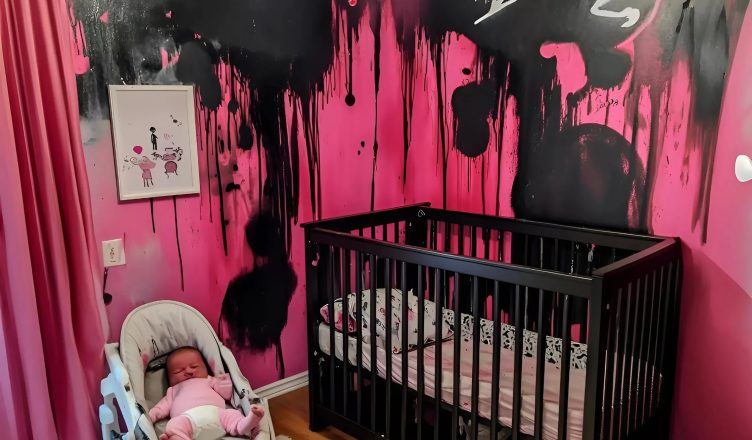Bringing my newborn daughter home was supposed to be one of the happiest moments of my life.
For nine months, I had planned every detail of her arrival. Her nursery was my sanctuary. I painted the walls soft pink, hung delicate curtains, placed hand-picked stuffed animals on the shelves, and set up a white crib with care and love. Every item, every brushstroke, was a message to her: You are loved. You are safe.
But the moment I walked through that door, holding her tiny sleeping body, my joy shattered.
Her room was gone.
A Room Erased
The nursery door was ajar. I pushed it open and froze in place.
The pink walls had been painted over — deep, glossy black. Not dark gray. Not navy. Black, as if someone had tried to erase every ounce of warmth and light.
The crib was broken. One of its legs lay detached on the floor. The toys, the pillows, the books, the soft lighting — all gone. Empty shelves. Cold hardwood. A sense of hollow space that echoed louder than any scream.
My husband stood silently behind me in the hallway. He didn’t follow me in. He didn’t say a word.
I turned to him.
“What happened?”
His silence said more than any sentence could.
And I knew. Deep down, I already knew who had done this.
His mother.
The Woman Who Didn’t Want a Granddaughter
She never wanted to bond with me. From the beginning, she was cold, sharp, and hard to read. But everything changed when we announced I was pregnant.
Her only question had been: “Is it a boy?”
When we told her it was a girl, there was a pause on the phone. Then: “Oh. That’s unfortunate.”
I tried to believe she would soften. That once she saw her granddaughter, she’d fall in love. That she’d find joy in being a grandmother, no matter the child’s gender.

Instead, she became colder. More critical. She undermined every decision I made during pregnancy. “You’re too emotional.” “You’re spoiling the baby already.” “You’ll never raise her to be strong in that cotton-candy room.”
And apparently, she decided to do something about it.
“Pink Makes Girls Weak”
When the truth finally came out — when my husband admitted she had repainted the nursery while I was still in the hospital — I demanded to know why he let it happen.
“She said she was helping,” he mumbled.
Helping.
As if obliterating a baby’s nursery days before she came home was an act of kindness.
Later, she told me herself, without a hint of regret: “A girl shouldn’t be raised in softness. The world is harsh. She needs to be strong. That pink prison you made for her will make her weak.”
It wasn’t about color. It was about control. She didn’t see a room — she saw a threat to her authority. To her outdated beliefs. And she used my most vulnerable moment to assert herself.
But what broke me more than the room, more than the paint or the crib, was the fact that my husband let it happen.
He watched it unfold. And he didn’t stop it.
The Quiet Rage of a New Mother
That night, I didn’t cry. I didn’t scream.
I held my baby close, fed her in silence, and let the weight of everything settle in.
I realized that if I didn’t reclaim my space now — physically and emotionally — I would never get it back. If I allowed this violation to pass, I would set the tone for the rest of my motherhood.
So the next morning, I gave my husband a choice.
“She doesn’t come into this house again. Ever. And if you can’t support that, you can leave with her.”
A Woman Who Rebuilt
It took me two weeks to repaint the nursery. I did it myself. With a newborn in one arm and a brush in the other.
I chose soft creams and lavender this time. I bought a new crib. I ordered new shelves, new lights, new books. I restored the magic that had been stolen — not because of the color, but because of what it represented: my right to create a world of love for my daughter.
My husband stayed. He apologized. He tried to explain. I listened, but I was different now.
I was no longer the woman hoping for approval. I was a mother protecting her child — and herself.
